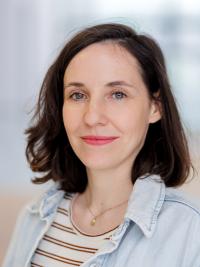Interview
Everyday History you can touch: How the "Basics of Curating" influenced Markus Haake's Work as a Historian

In our training course "The Basics of Curating", experienced curators provide insights behind the scenes of the exhibition business. The 6th course starts in March. Bremen history researcher Markus Haake also took away ideas for the work in his project forge.
Reviving times gone by: Markus Haake from Bremen is committed to researching regional everyday history. In doing so, he delves deep into the microcosm of past customs and cultures. The topics researched in his project forge "Microworlds" find their way into exhibitions, media contributions and documentaries. In order to professionalise his exhibition work, he completed the 5-day training course "The Basics of Curating" in 2022. In an interview, he talks about what he learnt.
JS: Why did you decide to take part in the "The basics of curating" training course in 2022?
MH: I gained my first practical experience in the field of exhibitions in the early 2000s at the Bremen Association for Research and Communication of European Regional and Everyday History. In 2016, I finally founded "Microworlds" – a project forge for regional cultural studies, where I also plan and realise exhibition projects, among other things. I mainly took part in further training to expand my knowledge of practical exhibition work.
JS: During the five-day intensive course, you gained an insight into the world of experienced curators. Which aspect inspired you the most?
MH: I particularly benefited from the curators' experience in realising their previous exhibitions. Three aspects in particular have stayed with me. Firstly, familiarising yourself with the local conditions when planning the exhibition. Secondly, what is important when writing exhibition texts. Thirdly, borrowing objects and digital possibilities for exhibition work.
JS: Who would you recommend "The Basics of Curating" to?
MH: In my opinion, freelancers in the museum context in particular can benefit from the curators' wealth of experience, but museum employees can also take away many impressions for their own work.
JS: Which of the content you learnt could you integrate into your work?
MH: When realising my projects, the rules for exhibition texts and the copyright information proved to be particularly helpful. Overall, the training enabled me to professionalise my project work in the exhibition sector.
JS: Can you give us an insight into a project or initiative that you started or supported after the training programme?
MH: As part of my self-employment, I carried out the project Local Places "Digital" – Historical Postcard Stories in the Elbe-Weser Region in 2021/2022. This is a research and presentation project on selected local places of historical everyday life in the context of industrial and mass cultural change in the Elbe-Weser region. Using the example of historical postcard views, the special features of a total of 20 local places and towns were analysed as formerly striking and still visible evidence of regional everyday culture and presented in public spaces with the help of mobile applications (QR codes and web presentation).
The interview was conducted by Julia Sammler.
Contact
ZEW – Further Education Unit
